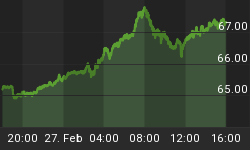The thing to understand about inflation is that if one major country does it, all the others have to do it too. A single country can benefit by making its currency less valuable, because a falling exchange rate gives its exporters a pricing edge in global markets. But the pop in exports comes at the expense of competitors who then demand that their governments join the currency race-to-the-bottom.
This happened to Switzerland in September, as global capital poured into what was seen as a financial safe haven. The Swiss franc soared, traumatized local exporters complained, and the government pegged the Swiss franc to the euro, in effect putting it on the same road to oblivion as Europe's doomed common currency.
Now it's Japan's turn:
Car Maker Cuts Profit Goal by 54%; Strong Yen Is 'Destroying' Japanese Industry
TOKYO: Toyota Motor Corp. slashed its profit outlook by more than half, reflecting the corrosive effect of the strong yen and signaling a deeper threat to car maker's recovery.
The Japanese auto giant Friday also lowered its global sales outlook to 7.38 million vehicles for the fiscal year ending March 31, an admission Toyota could lose its crown as the world's largest car maker this year, a title it took from General Motors Corp. three years ago.
Toyota has been wounded by two natural disasters and the rise of the yen against other currencies. Just as the company's production was rebounding after Japan's massive earthquake in March, it was hit by flood damage to key component suppliers in Thailand and a record yen.
Those setbacks have eroded Toyota's position against global rivals including Hyundai Motor Co. and Volkswagen AG, and pose longer-term worries for one of Japan's most important industrial giants. Toyota has lost 2.5 percentage points of the U.S. auto market for the 12 months ended in November. Its stock price in New York has fallen 33% since the end of February.
Toyota officials have said that at exchange rates below 80 yen to the dollar, the company loses money on subcompact exports such as the Yaris. The dollar and euro weakness against the yen reduces the price competitiveness of Japanese exports in overseas markets and erodes the value of foreign profits on corporate Japan's balance sheets.
Satoshi Ozawa, Toyota's chief financial officer, said one of the reasons the auto maker was exposed to the Thai floods was because so much of Japanese industry has been shifting manufacturing operations offshore to escape the high yen, including auto parts makers.
"The fact that production of some electronic parts has been offshored [to Thailand] signals how the destruction of Japan's industrial base is proceeding apace. I find that very shocking," he said.
Toyota still makes in Japan nearly half the vehicles it sells globally, leaving it more exposed to currency risk than Japanese rivals Nissan Motor Co. and Honda Motor Co., which make about a third of their respective output in Japan.
For its current fiscal year, which runs through next March, Japan's biggest car maker by volume said it now projects a net profit of ¥180 billion ($2.32 billion), down 54% from a previous estimate announced in August and less than half the ¥408 billion it earned last year.
Toyota expects the shortage of parts from Thailand suppliers to be fully remedied by next March. But it projected continued yen strength next year, which bodes ill for a quick earnings rebound.
The Toyota City-based company's new forecast assumes an average exchange rate of ¥77 to the dollar from this month through March, and ¥105 against the euro. That is up from ¥86 to the dollar and ¥113 to the euro in the last fiscal year. The rate was 77.6463 yen to the dollar at the end of Friday's trading.
At current exchange rates, the company forecasts a parent, or unconsolidated, loss of ¥80 billion yen, which would mark its first dip into the red in reported after-tax income.
If mighty Toyota can't turn a profit with the yen at current levels, the Japanese government has no choice but to lower the value of its currency. It will accomplish this by creating hundreds of billions of dollars worth of yen and using them to buy euros and dollars, sending the dollar and euro up and yen down in relative terms.
Once a process like this gets going it can't be stopped because no single central bank can step off the track without seeing its currency soar and its export industries implode. The ultimate end, of course, is the descent of the world's major currencies to the value of the paper on which they're printed.
As crazy as this seems to modern sensibilities, it isn't historically unique. Just the opposite. All fiat currencies end this way, a victim of politicians' (or kings') need to satisfy powerful constituencies. Give a government a printing press, in other words, and it will use it as long as it can.
Meanwhile, in each and every past case of currency destruction, the owners of gold and silver were not only spared the worst of the trauma, they were enriched.















